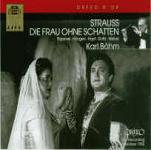This recording, live from the Vienna State Opera in 1955, was taped just weeks before virtually the same cast (there’s only one major difference) entered the studio and recorded it for Decca. The performances are remarkably similar: Karl Böhm, a master of this complex, beautiful score, presents it almost complete (there are, I believe, very small cuts here and there) and has assembled a superb, enthralled, and enthralling cast. The one major change from the studio recording is that whereas Paul Schöffler was the Barak for Decca, here we get Ludwig Weber, whose voice may be somewhat less beautiful than Schöffler’s, but is easily as expressive, endearing, and impressive.
Leonie Rysanek is the familiar Empress, seemingly hypnotized and enchanted, her voice settling down after some initial pitch problems mid-range to offer a glorious reading, with gleaming, cutting top notes and true sentiment throughout. She makes us feel for the character and her plight. Her Emperor is the beefy tenor Hans Hopf, who is less crude than usual and has the notes and stamina for the role, particularly in the seemingly endless final scene, which, when presented as complete as is it here, can be quite a challenge.
As the Dyer’s Wife, Christel Goltz is not quite in the same class with the others; her singing is secure and good enough but she lacks any subtlety and can’t compare with, say, Christa Ludwig in the role. Elisabeth Höngen’s Nurse is nasty and biting, and she gets through the role without shouting. Kurt Böhme’s Messenger is potent and the rest of the cast–Vienna stalwarts from the ’50s–is top notch.
Böhm captures just the correct otherworldliness of the music, and the Vienna Philharmonic, tam tam, gongs and all, plays with great feeling and love. The sound is pure, clear monaural (the studio recording is early stereo but is essentially no better), with even the harps audible; Strauss’ exotica is underlined but not so prominent that we can’t hear the gorgeously tonal score. The vibrancy of the live experience is thrilling. If you own the Decca, you won’t need this, really, but you must own one or the other.
































